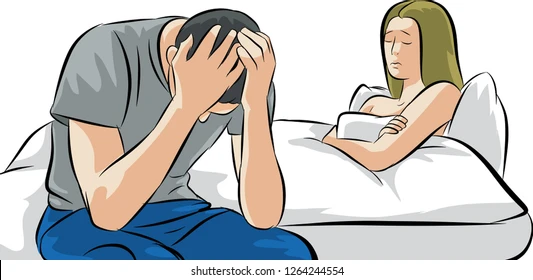Sexual Dysfunction: Disorders, Causes, Types & Treatment
Today, 30 to 40 percent of marriages end because people don’t know enough about sex. Misunderstandings can ruin relationships, especially when sex life suffers. Instead of seeking help, many stay quiet about their problems.
In the internet age, wrong information causes a lot of sexual issues. More than half of people still rely on fake doctors for help.
Sex isn’t just for making babies; it’s also about pleasure and reducing stress. We should think practically about celibacy, not just as a strict rule. Having sex at the right time and in the right way, with commitment and a positive mindset, is part of this understanding.
At our clinic, we find the causes of sexual problems through counseling. Then we use Ayurvedic and herbal medicines to treat them.
Premature ejaculation (PE)
Premature ejaculation (PE) is a common sexual dysfunction where ejaculation occurs sooner than desired, often within one minute of penetration. This condition can lead to distress, frustration, and avoidance of sexual intimacy. Causes of PE can be both psychological and biological. Psychological factors include anxiety, depression, stress, and relationship problems, while biological factors may involve hormonal imbalances, abnormal neurotransmitter levels, inflammation or infection of the prostate or urethra, and genetic predisposition. Symptoms are characterized by a consistent inability to delay ejaculation, resulting in personal distress and negative impacts on relationships.
Treatment for premature ejaculation involves a combination of behavioral techniques, medications, and therapy. Behavioral methods such as the stop-start method and the squeeze technique help delay ejaculation. Medications, including certain antidepressants and topical anesthetics, can also be effective. Counseling, particularly cognitive-behavioral therapy (CBT), addresses underlying psychological issues contributing to PE. Additionally, lifestyle changes like regular exercise, a balanced diet, and stress management techniques such as mindfulness and meditation can support overall sexual health and improve symptoms. For expert advice and personalized treatment, consult Dr. Lalit Heda, a renowned consultant sexologist. Take the first step towards a better quality of life and schedule your appointment today.
Types of Premature ejaculation
Lifelong Premature Ejaculation
Lifelong premature ejaculation begins during the first sexual experiences and persists throughout life. Men with this type consistently experience rapid ejaculation, often within one minute of penetration, in nearly all sexual encounters. The exact cause is often unknown, but it is thought to be linked to genetic factors, neurobiological conditions, and early sexual conditioning.
Acquired Premature Ejaculation
Acquired premature ejaculation develops after a period of normal sexual function. This type can be caused by various factors, including psychological issues such as stress, anxiety, or relationship problems. Biological factors like hormonal changes, inflammation or infection of the prostate, or thyroid dysfunction can also contribute. Unlike lifelong PE, acquired PE may resolve with treatment of the underlying cause.
Understanding these types helps in diagnosing and choosing the most effective treatment approach for each individual. If you are experiencing symptoms of PE, consulting a healthcare professional like Dr. Lalit Heda, a consultant sexologist, can provide a path to effective management and improved sexual health.
Main Causes of Premature Ejaculation
Premature ejaculation (PE) can be influenced by a combination of psychological and biological factors. Understanding these causes is crucial for effective treatment and management.
Psychological Causes
- Anxiety: Performance anxiety or general anxiety can trigger premature ejaculation. Worrying about sexual performance can make it difficult to control ejaculation.
- Stress: High levels of stress, whether related to work, personal life, or sexual performance, can contribute to PE.
- Depression: Depression can reduce sexual desire and lead to premature ejaculation.
- Relationship Issues: Problems in a relationship, such as lack of communication, unresolved conflicts, or emotional disconnect, can lead to PE.
- Guilt and Shame: Negative feelings about sexual experiences or societal taboos can also play a role.
Biological Causes
- Hormonal Imbalances: Abnormal levels of hormones such as testosterone can affect sexual function.
- Neurotransmitter Levels: Variations in neurotransmitters, chemicals in the brain that transmit signals, can impact ejaculation control.
- Prostate Problems: Inflammation or infection of the prostate or urethra can contribute to PE.
- Genetic Factors: A family history of PE suggests that genetics may play a role.
- Erectile Dysfunction: Men who are anxious about maintaining an erection may develop a pattern of rushing to ejaculate, leading to PE.
Understanding these causes is the first step towards effective management. For personalized advice and treatment, consider consulting Dr. Lalit Heda, a specialist in sexual health, who can provide comprehensive care tailored to your needs.
Premature ejaculation (PE) is a condition characterized by the following symptoms:
Rapid Ejaculation: Ejaculation consistently occurs within about one minute of sexual penetration or even before penetration in some cases.
Lack of Control: The main symptom is the inability to delay ejaculation during intercourse, leading to reduced sexual satisfaction for both partners.
Emotional and Psychological Impact: The condition often leads to negative personal consequences, such as feelings of depression, anxiety, frustration, and the avoidance of sexual intimacy due to fear of repeated episodes of premature ejaculation.
Mutual Struggle: Both partners find it hard to live together.
Trust Issues: Premature ejaculation causes disappointment and reduces trust in the relationship.
Mental Distress: Men feel a lot of mental pain and stress.
Embarrassment: Men often feel very ashamed.
Depression: Keeping the problem a secret can lead to depression and other health issues.
Anxiety: Many men become anxious.
Premature ejaculation can be cured in 90% of cases. We teach special techniques to help men last longer using psychological therapy and sex education after diagnosing the problem. We also offer side-effect-free Ayurvedic medicine if needed. Additionally, we use treatments to prevent issues caused by aging, making your sex life more enjoyable as you get older.
These symptoms can significantly impact one’s quality of life and intimate relationships, making it important to seek appropriate medical or therapeutic intervention.

Erectile Dysfunction / Erectile Dysfunction / Impotence
Erectile dysfunction (ED), often referred to as impotence, is a prevalent condition affecting men globally. It is characterized by the inability to achieve or maintain an erection sufficient for satisfactory sexual performance. This issue can profoundly impact a man’s self-esteem, relationships, and overall quality of life. Understanding the comprehensive aspects of ED—from symptoms and causes to diagnosis and treatment options—is crucial for effective management and support.
Symptoms of Erectile Dysfunction
The primary symptom of erectile dysfunction is the persistent inability to achieve or maintain an erection. This difficulty may manifest intermittently or consistently and can lead to reduced sexual desire and performance anxiety. Men experiencing ED may also encounter challenges with ejaculation, further complicating sexual intimacy.
Common Causes of Erectile Dysfunction
Erectile dysfunction can arise from a variety of physical and psychological factors. Physical causes include cardiovascular diseases (such as hypertension and atherosclerosis), diabetes mellitus, obesity, hormonal imbalances, and neurological disorders. Psychological factors such as stress, anxiety, depression, and relationship issues can also contribute significantly to ED. Moreover, lifestyle choices like smoking, excessive alcohol consumption, and substance abuse can exacerbate the condition.
Diagnosing Erectile Dysfunction
Diagnosing erectile dysfunction involves a thorough assessment by a healthcare professional specializing in men’s sexual health. A comprehensive evaluation typically includes a detailed medical history, a physical examination, and possibly laboratory tests to identify underlying health conditions. Additional assessments such as nocturnal penile tumescence (NPT) testing may be conducted to evaluate the quality of nocturnal erections.
Treatment Options for Erectile Dysfunction
Effective treatment of erectile dysfunction depends on addressing the underlying cause(s) and tailoring therapy to individual needs. Treatment options include:
Lifestyle Modifications Adopting a healthy lifestyle is fundamental in managing erectile dysfunction. Regular physical exercise, a balanced diet rich in fruits, vegetables, and whole grains, smoking cessation, and moderation in alcohol consumption can improve overall health and potentially alleviate ED symptoms.
Medications Oral medications such as sildenafil (Viagra), tadalafil (Cialis), and vardenafil (Levitra) are commonly prescribed to enhance erectile function. These medications work by increasing blood flow to the penis, facilitating erections when sexual stimulation occurs. It is essential to consult a healthcare provider for proper dosing and potential side effects.
Psychotherapy and Counseling For men whose erectile dysfunction is primarily psychological, therapies like cognitive-behavioral therapy (CBT), sex therapy, and counseling can be highly effective. These approaches address underlying emotional issues, reduce performance anxiety, and improve overall sexual confidence.
Medical Procedures In cases where conservative treatments are ineffective, medical procedures may be considered. Penile implants, which are surgically placed devices that allow for on-demand erections, offer a reliable solution for severe ED. Vascular surgery to improve blood flow to the penis and the use of vacuum erection devices are other viable options.
Preventive Measures Preventing erectile dysfunction involves maintaining a healthy lifestyle and managing risk factors. Regular exercise, a nutritious diet, managing chronic health conditions like diabetes and hypertension, and addressing psychological stressors can help preserve erectile function. Routine medical check-ups are essential for early detection and intervention.
Conclusion:
Erectile dysfunction is a prevalent condition that can significantly impact a man’s life and relationships. By understanding its symptoms, causes, diagnosis, and treatment options, individuals can make informed decisions about managing and overcoming ED. Seeking professional help from specialists such as Dr. Lalit Heda, a renowned consultant sexologist and Ayurveda specialist, can provide personalized care and effective solutions tailored to individual needs. With proper support and proactive management, men can regain confidence in their sexual health and improve their overall well-being.
For expert guidance and personalized treatment of erectile dysfunction, contact Dr. Lalit Heda, a trusted consultant sexologist and Ayurveda specialist. Schedule your consultation today to take the first step towards reclaiming your sexual health and vitality.

Dhat syndrome
Dhat syndrome is a culture-bound syndrome primarily observed in South Asian countries, where individuals have an intense fear of losing semen. This fear leads to various psychological and physical symptoms, often accompanied by anxiety and distress. It is categorized under somatic symptom disorders due to its focus on bodily functions.
Causes of Dhat Syndrome
The exact causes of Dhat syndrome are multifaceted and involve cultural, psychological, and biological factors. Cultural beliefs play a significant role, where semen is perceived as vital energy or life force. Individuals may develop this syndrome due to societal pressures, misinformation, or traumatic experiences related to sexual health.
Symptoms of Dhat Syndrome
Symptoms of Dhat syndrome can vary widely but generally include:
- Persistent anxiety about losing semen
- Fatigue and weakness
- Mood swings and irritability
- Sexual dysfunction, including erectile dysfunction or premature ejaculation
- Depressive symptoms such as loss of interest in daily activities
These symptoms can significantly impact an individual’s quality of life, leading to social withdrawal and impaired functioning in daily tasks.
Diagnosis and Evaluation
Diagnosing Dhat syndrome involves a thorough assessment by a qualified healthcare professional. It typically includes:
- Detailed medical history to understand the onset and progression of symptoms
- Physical examination to rule out any underlying medical conditions
- Psychological evaluation to assess mental health status and determine the presence of anxiety or depressive disorders
Laboratory tests may also be conducted to rule out physical health issues contributing to the symptoms.
Treatment Options
Treatment for Dhat syndrome is tailored to address both the psychological and physical aspects of the condition. It often includes:
- Psychotherapy, such as cognitive-behavioral therapy (CBT), to address distorted beliefs and reduce anxiety
- Medications to manage symptoms of anxiety and depression
- Education and counseling to provide accurate information about sexual health and debunk misconceptions
- Lifestyle modifications including regular exercise and healthy diet to promote overall well-being
In severe cases, hospitalization and intensive therapy may be necessary to stabilize symptoms and provide comprehensive care.
Living with Dhat Syndrome
Living with Dhat syndrome requires ongoing support and management. It is essential for individuals to:
- Attend regular therapy sessions to monitor progress and address any setbacks
- Engage in self-care practices such as mindfulness and stress management techniques
- Maintain open communication with healthcare providers and loved ones for support
Understanding and acceptance from family and community members can also play a crucial role in reducing stigma and promoting recovery.
Conclusion
In conclusion, Dhat syndrome is a culturally influenced disorder that manifests through anxiety and distress related to semen loss. It impacts various aspects of an individual’s life, necessitating a holistic approach to treatment that addresses both psychological and physical health. By raising awareness and providing evidence-based care, we can support individuals affected by Dhat syndrome on their journey to recovery.
Consultation with Dr. Lalit Heda
If you or someone you know is struggling with Dhat syndrome, consider consulting with Dr. Lalit Heda, a renowned consultant sexologist and Ayurveda specialist. Dr. Heda offers personalized treatment plans tailored to address the specific needs of individuals dealing with sexual health issues, including Dhat syndrome. To schedule a consultation or learn more about available treatment options, Contact Dr. Lalit Heda.

LOW SEX DRIVE
Low libido is a common sexual issue that can affect anyone, regardless of gender.
It can significantly impact your sexual life and, if left unaddressed, can negatively influence your married life. Men, in particular, may experience a drop in self-confidence, a decrease in sexual power, and a growing indifference towards sex. The causes of low libido are numerous, including hormonal imbalances, obesity, excessive alcohol consumption, smoking, serious illnesses, overuse of medications, relationship stress, lack of sleep, and depression.
Our sex counseling and relaxation therapy offer effective solutions for this condition.
We provide treatments for a range of sexual problems such as fatigue after intercourse, issues related to masturbation, pain during intercourse, and concerns about penis shape or size.
PREMARRIAGE COUNSELING & PREMARITAL CHECK-UP
In India, the lack of sex education leads to many misconceptions among newly married couples. They often lack essential knowledge, which can cause relationships to falter shortly after marriage, sometimes even resulting in divorce. Many individuals also suffer from infertility due to inadequate education.
Through sex education, we teach couples about the values of marriage, important rituals, and the secrets to maintaining healthy and happy relationships. This education helps them start their new life with confidence and without hesitation.
Our premarital check-up includes tests such as HIV, SBSG, sonography, and semen analysis.
Contact Dr. Lalit Heda
For expert advice and personalized treatment, consult Dr. Lalit Heda, an Ayurveda Specialist and Consultant Sexologist. Dr. Heda provides compassionate care and effective solutions tailored to your unique needs.
Take the first step towards a healthier, more fulfilling life. Contact Dr. Lalit Heda today!

COUPLE /MARRIAGE COUNSELING
आजकल तनाव, व्यसन, डिप्रेशन, सक्सायडल बिहेवियर, यौन समस्याए तरुणो में बढ़ रही है. इसके अलावा डायबिटिस, हार्ट डिसिज इससे भी उम्र कम हो रही है. इन सभी चीजों की वजह से कपल्स के बीच शारीरिक और मानसिक संबंध प्रतिदिन खराब हो रहे है. हमारे कौंसेलिंग के बीच हम कपल्स को अच्छे संबंध किस प्रकार बनाए/निभाए, वैवाहिक जीवन में संभोग की आवश्यकता इसके प्रति जानकारी देते है. अगर किसी मे कुछ समस्या होती है तो उसे हम आवश्यकतानुसार औषधि से ठीक करते है.

COUPLE / MARRIAGE COUNSELING
Today, many young people face rising levels of stress, addiction, depression, and even suicidal thoughts. On top of these mental health issues, more people are dealing with diabetes and heart disease, which are cutting lives short. These problems put a lot of strain on couples, weakening their physical and emotional connections.
Dr. Lalit Heda, an experienced Ayurveda Specialist and Consultant Sexologist, is here to help couples overcome these challenges. In our counseling sessions, we teach couples how to maintain a healthy and happy relationship. Dr. Heda focuses on the importance of intimacy in marriage and offers practical advice for staying connected.
If specific issues come up, Dr. Heda creates personalized treatment plans, which can include Ayurvedic remedies and necessary medications. His holistic approach addresses both physical and mental health, helping couples achieve overall well-being and harmony.
Don’t let stress and health problems ruin your relationship. Schedule a consultation with Dr. Lalit Heda today and start improving your connection. Contact us now to book an appointment and begin your journey to a happier, healthier partnership.

